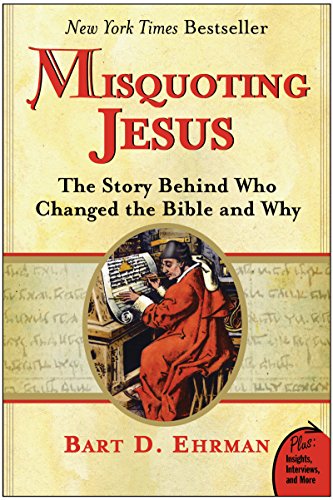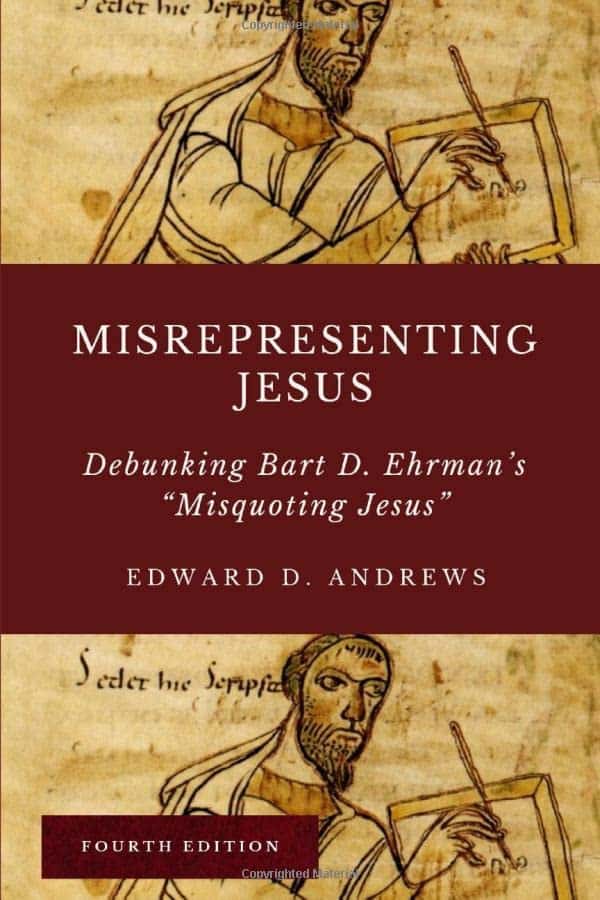“The more I studied the manuscript tradition of the New Testament, the more I realized how radically the text had been altered over the years at the hands of the scribes… It would be wrong to say that the changes in our text have no bearing on what the texts mean or on the theological conclusions that one draws from them.”
— Bart Ehrman, Misquoting Jesus: The Story Behind Who Changed the Bible and Why
Over the years, countless voices have questioned the reliability of the Bible. Critics often argue that it’s filled with contradictions, copyist errors, or that it has been changed too many times to be trusted. Some even go as far as to say that Christians are naive for putting their faith in a book that, according to them, can’t be proven accurate.
But is that really the whole story?
If the Bible is the foundation of our faith—guiding how we live, what we believe, and how we view God—then it’s a question worth exploring seriously. Can we be confident in the accuracy and reliability of the Bible, or are we standing on shaky ground?
Let’s take a deeper look.
Is the Bible We Read Today Really Accurate?
Is the Bible We Read Today Really Accurate?
Let’s get straight to the point: Yes, the Bible you’re holding—if it’s one of the major modern translations—is extremely accurate. In fact, scholars estimate that today’s Bible reflects the original writings with 99.999% accuracy.
That tiny 0.001%? It mostly includes minor spelling differences and small copyist errors that occurred as scribes hand-copied manuscripts. None of these affect the core message of the Gospel, the life and teachings of Jesus, or the instructions for living a faithful Christian life. In short, the reliability of the Bible is not only defensible—it’s supported by overwhelming evidence.
Still, some people ask: Can we really trust that what we read today are the actual words of Jesus, the apostles, and the prophets? After thousands of years and countless copies made by hand, isn’t it natural to assume errors crept in?
These are fair questions—and they deserve solid answers.
Let’s take a closer look at the evidence behind the reliability of the Bible. Has it truly been preserved like no other text in human history? Are Christians being naïve to trust it, or are there good reasons to believe in its integrity?
While the Old Testament is deeply important and foundational, we’ll be focusing primarily on the New Testament in this discussion—to keep things concise and centered on the most frequently debated material.
The Reliability of the Bible: Time to Educate Ourselves
The Reliability of the Bible: Time to Educate Ourselves
There’s been an ongoing debate in Christian circles about whether the United States has become a post-Christian nation. The answer to that depends on how you define the term—but it’s clear that biblical literacy is declining, especially among younger generations.
One major issue? Many churches are falling short when it comes to teaching a biblical worldview—especially when it comes to equipping kids and teens before they head off to college or enter adulthood. Yes, we often teach them the message of Jesus and the hope found in Scripture, but we rarely take time to show them why the Bible is trustworthy.
We tell them what to believe—but we don’t always explain why they can believe it.
Few young believers are taught about the reliability of the Bible itself—the historical accuracy, the manuscript evidence, and the reasons we can be confident in the text they’re reading today. And that’s a serious gap in discipleship.
In fact, a Lifeway Research study revealed that 66% of young people who attended a Protestant church as teens stopped attending regularly once they reached adulthood. While many factors contribute to that, a lack of confidence in the Bible’s authority and trustworthiness is often part of the story.

It’s hard to deny that many of today’s universities promote worldviews that no longer reflect It’s hard to deny that many of today’s universities promote worldviews that no longer reflect traditional Judeo-Christian values. In fact, it would be disingenuous to argue otherwise. If you’ve been paying attention to the state of education in the U.S., this isn’t really up for debate anymore.
So where do we go from here?
I believe one of the biggest gaps in our churches—especially when it comes to preparing teenagers for the real world—is the lack of foundational teaching in apologetics. Simply put, apologetics is a logical defense of our faith. More formally, it’s defined as:
“The intellectual defense of the truth of the Christian religion, usually considered a branch of theology.”
Parents across the country are doing their best to raise their kids with a strong relationship with Jesus and a solid understanding of God’s Word. And praise God—many teens embrace that truth and walk in it. The heart of the Christian life will always be about grace through faith in Christ, not knowledge or works.
But here’s the reality: if we fail to provide our kids (and adults, too) with a clear understanding of the historical and textual reliability of the Bible, we leave them vulnerable to doubt—especially when they encounter professors or influencers who challenge their faith with academic or cultural skepticism.
We can’t just tell the next generation what to believe—we must also show them why they can trust it.
Want to Build Your Apologetics Foundation?
Here are a few excellent resources to help you (and your kids) grow in this area:
- 📘 Mama Bear Apologetics: Empowering Your Kids to Challenge Cultural Lies
- 📘 The Case for Christ by Lee Strobel
- 📘 Cold-Case Christianity by J. Warner Wallace
These books offer a great starting point for learning how to defend your faith and understand the evidence behind the reliability of the Bible.

For certain, those who do not have a Biblical worldview will continue to offer an opposing view of the Bible’s reliability. They will have and teach a view that is contrary to the many centuries of faithfully preserved manuscriptural evidence, and the overwhelming number of historically reliable Old and New Testament scriptures.
We consistently put 18-year-olds without a decent knowledge of defending the faith into where they are confronted with professors steeped in their secular worldview. Then we find that they arent equipped to handle it, to properly defend their faith ,and remain solid in their faith.
We let that student go through 4+ years in which many of the most important adults in their lives do not believe in the Biblical record and are not followers of Christ. Then we wonder why we are losing the culture to the false claims of the extreme left.
Defending the Word
One problem that the Christian church has is that we don’t always learn to defend the Bible enough for ourselves. I have been in ministry for over 35 years. I love pastors and teachers. Listen to them and learn from them. However, when you are speaking to people who need to know the gospel and you need to defend the accuracy of the scriptures, you can’t simply say, “Well, here is what my pastor says!”
Despite the overwhelming evidence supporting the reliability of the Bible, there will always be those who reject it. People who don’t hold a biblical worldview often promote alternative interpretations and cast doubt on Scripture’s trustworthiness. They ignore centuries of faithfully preserved manuscripts and the massive amount of historical support for both the Old and New Testaments.
And yet, we continue to send 18-year-olds—many without a solid understanding of how to defend their faith—into environments where they’re taught by professors deeply rooted in secular thinking. When they’re challenged, they often don’t know how to respond. Not because their faith isn’t real, but because they were never equipped with the tools to defend the reliability of the Bible and hold firm in what they believe.
We then watch those students spend four or more years surrounded by influential adults—professors, mentors, peers—who don’t believe in the biblical record or follow Christ. Should we really be surprised when so many young adults drift away from their faith and adopt the narratives pushed by modern culture?
Know These Arguments for Yourself
Another problem we face in the Church is that many believers haven’t taken the time to personally learn how to defend the Bible. I’ve served in ministry for over 35 years, and I have the utmost respect for pastors and teachers. Their voices matter. We should listen to them and learn from them.
But when you’re in a real-world conversation—whether it’s with a skeptic, a curious friend, or your own child—it’s not enough to say, “Well, my pastor said so.” That won’t cut it.
We need to be able to articulate, with clarity and confidence, why we believe the Bible is accurate, trustworthy, and divinely preserved. It’s not just about having answers for others—it’s about having assurance for ourselves.
So yes, love your pastors and lean on your teachers—but also take ownership of your faith. Invest in your own understanding of the evidence behind the Bible’s reliability, and be ready to give an answer when the questions come.
The Reliability of the Bible: Where Do We Even Start?
When I first started out in ministry, the internet didn’t exist. If you wanted to research a theological topic or dig deeper into biblical studies, you had to pull out commentaries, visit a library, or call someone who knew their stuff.
Today, it’s a different world.
Now, with just a few keystrokes, you can find thousands of articles, videos, and sermons on any biblical subject you can think of. Platforms like YouTube give us access to a wide range of pastors, teachers, and scholars—some of them incredibly helpful, others… not so much. While YouTube shouldn’t be your primary source of theology, if you’ve got a solid foundation, it can be a valuable tool for learning and discernment.
A while back, I came across a lecture on YouTube by Professor Bart D. Ehrman, author of Misquoting Jesus: The Story Behind Who Changed the Bible and Why. Just from the title, I expected to hear a narrative that questioned or denied the reliability of the Bible—and to be honest, I was skeptical right from the start.
At first, I dismissed his talk. My initial reaction was, “Here we go—another left-leaning academic trying to tear down Scripture.” I didn’t finish the entire video. But something kept bugging me, and I later realized I had made a mistake by tuning out too early.
Because here’s the thing: Dr. Ehrman is no lightweight. He’s not just another guy ranting on the internet. He’s one of the most well-known and respected New Testament textual critics of the last few decades. He communicates clearly. He’s done his homework. His arguments are backed by deep study and extensive scholarship.
This isn’t a conversation about Bible translation preferences (NIV vs. KJV). Ehrman’s critiques go much deeper, touching on manuscript history, scribal transmission, and textual integrity. And whether or not you agree with his conclusions, you can’t ignore his influence—especially when he’s shaping the views of students, skeptics, and even some Christians.
In fact, Dr. Daniel Wallace, another prominent scholar, has referred to Bart Ehrman as “the number one apologist for skepticism” in our time.
So where do we begin in understanding and defending the reliability of the Bible? It starts by knowing what voices are out there, what they’re saying, and being ready to engage—not with fear, but with confidence rooted in truth.

Dr. Bart D. Ehrman is widely regarded as one of the world’s leading experts in New Testament textual criticism. His academic credentials are impressive, and his influence is undeniable. But while his scholarly background is rooted in evangelical Christianity, Ehrman now identifies as an agnostic—and at times, an atheist, depending on how the terms are defined.
His shift in belief has fueled a body of work that frequently challenges the reliability of the Bible. His best-selling book, Misquoting Jesus: The Story Behind Who Changed the Bible and Why, has sold over two million copies and has shaped the worldview of countless readers—many of whom now question whether the Bible we read today is trustworthy.
At the heart of Ehrman’s argument is the claim that the Bible has been significantly altered over time. He asserts that the surviving copies of the New Testament are riddled with scribal errors, making it impossible to truly know what the original authors wrote. In short, he argues that we’re holding a book that has strayed far from its source.
But not everyone agrees with that conclusion—and thankfully, many credible scholars have stepped forward to respond.
One such voice is Edward D. Andrews, who directly addresses and debunks Ehrman’s claims in his book, Misrepresenting Jesus: Debunking Bart D. Ehrman’s Misquoting Jesus. Andrews and others argue that, while scribal errors exist—as they do in any hand-copied ancient text—these variations are minor and well-documented, and they do not compromise the message, theology, or integrity of the Bible.
The evidence overwhelmingly supports the view that the Bible we hold in our hands today is highly accurate and faithfully preserved.
You already read one of Dr. Bart Ehrman’s quotes at the beginning of this post. But here’s another statement from his book Misquoting Jesus that really captures his overall view on the New Testament manuscripts:
“Not only do we not have the originals, we don’t have the first copies of the originals. We don’t even have the copies of the copies of the originals, or copies of copies of copies of the originals.”
— Dr. Bart Ehrman
Now, I’ll be honest—part of me just wants to say, “Okay, Bart… take a hike.” But we can’t dismiss this so casually. This is a highly educated, articulate man—and he’s not alone. There are other scholars out there who, under the banner of academic credibility, work to undermine the accuracy and reliability of the Bible.
They present their views as objective scholarship, but their conclusions often reflect a worldview that outright rejects the divine inspiration and preservation of Scripture.
It’s important to recognize what’s really happening here. These aren’t just neutral observers raising casual questions. These are influential voices—intellectual leaders—who have shaped the thinking of students, readers, and even some Christians by casting doubt on whether we can trust the Bible at all.
Their core claim? That we’re too far removed from the original manuscripts to be confident in what the Bible really says.
But that’s not where the evidence leads—and in the next section, we’ll look more closely at why the Bible’s transmission history actually supports its trustworthiness, not undermines it.
Other scholars like Edward Andrews moved quickly to debunk “Misquoting Jesus…” His stance is that the words we hold in this book in our hands are so far removed from what was originally written and surviving copies are not accurate. Much of his argument deals with his claim that substantial errors were made by scribes down through the centuries.
Dr. Ehrman has already done a lot of damage. You can find those details and arguments that debunk his conclusions in the book, MISREPRESENTING JESUS: Debunking Bart D. Ehrman’s “Misquoting Jesus.’

You already read one of Dr. Bart Ehrman’s quotes at the beginning of this post. But here’s another sYou already read one of Dr. Bart Ehrman’s quotes at the beginning of this post. But here’s another statement from his book Misquoting Jesus that really captures his overall view on the New Testament manuscripts:
“Not only do we not have the originals, we don’t have the first copies of the originals. We don’t even have the copies of the copies of the originals, or copies of copies of copies of the originals.”
— Dr. Bart Ehrman
Now, I’ll be honest—part of me just wants to say, “Okay, Bart… take a hike.” But we can’t dismiss this so casually. This is a highly educated, articulate man—and he’s not alone. There are other scholars out there who, under the banner of academic credibility, work to undermine the accuracy and reliability of the Bible.
They present their views as objective scholarship, but their conclusions often reflect a worldview that outright rejects the divine inspiration and preservation of Scripture.
It’s important to recognize what’s really happening here. These aren’t just neutral observers raising casual questions. These are influential voices—intellectual leaders—who have shaped the thinking of students, readers, and even some Christians by casting doubt on whether we can trust the Bible at all.
Their core claim? That we’re too far removed from the original manuscripts to be confident in what the Bible really says.
But that’s not where the evidence leads—and in the next section, we’ll look more closely at why the Bible’s transmission history actually supports its trustworthiness, not undermines it.

Anyway, I’d like to just say. “take a hike.” But, here is a really smart dude – and there are others that we don’t have time to mention- who, in what appears to be a scholarly manner, attack the accuracy of the Biblical manuscripts. They don’t believe in the notion that the Bible is the word of God that has been faithfully preserved. They submit evidence that shows there have been massive changes to the scriptures since they were originally written – or do they?
Okay. Wait a second. This is not good.
It’s one thing for a non-believer, who knows very little about the Bible, who has never even checked out the claims of the Bible to argue against it. It’s another when those who are known as brilliant Biblical scholars to teach this kind of stuff.
Hmm. We’ll see about that.
Media and Pop Culture Attacks on the Reliability of the Media and Pop Culture Attacks on the Reliability of the Bible
Let’s talk about one of the more publicized attacks on the reliability of the Bible—an article published by Newsweek just two weeks before Christmas back in 2014.
In it, journalist Kurt Eichenwald launched a lengthy, sweeping critique of evangelical Christians and the Bible itself. Unsurprisingly, the timing—right before one of the most sacred seasons in the Christian calendar—was no coincidence. Critics of Scripture love to go on the offensive during Christmas and Easter.
Here’s one of the more striking (and absurd) statements from Eichenwald:
“No television preacher has ever read the Bible. Neither has any evangelical politician. Neither has the pope. Neither have I. And neither have you. At best, we’ve all read a bad translation—a translation of translations of translations of hand-copied copies of copies of copies of copies, and on and on, hundreds of times.”
— Kurt Eichenwald, Newsweek Magazine
Well… we’ll see about that.
Be Discerning with Popular Media
Let’s be honest—many modern journalists, particularly those outside the Christian faith, are not biblical scholars. Yet they often write with bold confidence about topics that trained theologians and historians have spent their entire lives studying. That should raise red flags for any thoughtful reader.
Sadly, today’s journalism is often less about objective reporting and more about advocacy for a particular worldview. Be discerning. When you see a sudden flood of media stories undermining biblical truth around major Christian holidays, take a step back and ask: What’s the real motive here?
The Da Vinci Code and the Reliability of the Bible
We also can’t ignore the influence of fiction presented as fact—like in the wildly popular novel (and movie), The Da Vinci Code by Dan Brown. Many people found it fascinating. But let’s be clear: if you actually believe the claims made in that story, you unravel the entire foundation of the New Testament.
The book suggests that Jesus was never viewed as divine until the Council of Nicaea in 325 A.D., when Emperor Constantine supposedly invented the idea of Jesus’ divinity. It also claims:
“The Bible has evolved through countless translations, additions, and revisions. History has never had a definitive version of the book.”
Is that true? Has the Bible been changed so many times that it’s now unreliable?
Absolutely not.
Those who’ve studied the historical transmission of Scripture know that the opposite is true: the Bible is the most reliably preserved document in the ancient world, with more manuscript support than any other work of antiquity.
From the early Church to the present, followers of Jesus have affirmed one truth loud and clear: Jesus wasn’t just a good man or wise teacher—He was, and is, God in the flesh. The early disciples didn’t come to that conclusion at Nicaea. They preached it from the very beginning.
Why This All Matters
Here’s the bottom line: these modern attacks—whether from journalists, authors, or Hollywood—don’t surprise me. I expect the mainstream media and pop culture to push back against biblical truth. That’s nothing new.
But what should concern us is when Christians don’t know how to respond.
So how do we handle these accusations against the reliability of the Bible—especially when they seem loud, polished, and persuasive?
We learn. We study. We equip ourselves with truth.
Because no matter how many times the Bible is criticized, the fact remains: it has stood the test of time for over 2,000 years—unchanged in message, unmatched in influence, and unwavering in truth.med journalists who do in-depth stories undermining what world-renowned, in-depth Biblical scholars have spent their entire lives studying – BEWARE. In today’s society, there are few true journalists left. However, there are many advocates for various belief systems.
Until the day God wraps all of this up and we’re standing in heaven, there will always be those who challenge the idea that the New Testament we have today is an accurate reflection of what the original authors wrote nearly 2,000 years ago.
Skeptics often argue that the Bible has been changed too much over time to be trusted. They claim that the ancient manuscripts lack integrity or that modern translations can’t possibly stand up to serious textual criticism.
The Telephone Game
One of the most popular illustrations used to support this claim is the old classroom activity known as the “telephone game.”
You probably remember it. A group of students sits in a circle. The teacher whispers a message to the first child, who then whispers it to the next, and so on. By the time the message gets around the circle, it’s almost always distorted beyond recognition. Words are missing, meanings are changed, and the final sentence often has no resemblance to the original.
Critics argue that the Bible was transmitted in the same way—passed along from person to person, century after century, until what we have now is just a messy, corrupted version of the original text.
But here’s the problem with that comparison: it’s completely inaccurate.
Why the “Telephone Game” Doesn’t Apply to the Bible
The telephone game is a whisper-down-the-lane exercise where no one is allowed to look back or check what was originally said. But the transmission of biblical manuscripts was nothing like that.
In reality, scribes made written copies, not whispered messages. And we have thousands of those handwritten manuscripts, some dating back to within decades of the original texts. These copies were not made blindly or in secret—they were carefully created, shared, and compared by communities who held Scripture in the highest regard.
What’s more, because of the sheer number of manuscripts we have—over 5,800 Greek New Testament manuscripts and tens of thousands of early translations and quotations—we’re able to cross-reference them. This allows scholars to confidently reconstruct the original wording with an extraordinary degree of accuracy.
Unlike the telephone game, we’re not relying on one untraceable stream of communication. Instead, we have a mountain of manuscript evidence, spread out across regions and centuries, that consistently points to a stable and reliable biblical text.

This illustrates one popular attack on the reliability of the Bible from liberal Biblical analysts. They talk as if our church fathers, then the scribes throughout history translated one manuscript after the other. One copy from the original, and then a copy from that copy, then a copy from that copy, then a copy from that copy, and so forth.
Wow- Bad News For Christians, Huh?
Christians have a fundamental need to have confidence that the Bible they hold in their hand is the written word of God. They need confidence that it’s historically accurate, and that God’s inspired word from Jesus, the apostles, and the prophets is reliable. They need to know that what was communicated from God’s messengers over 2000 years ago is the same message we have today.
If you accept the Bible as God’s word and believe in Jesus Christ as God’s plan to save humanity from their sins, but become plagued with doubts about the reliability of the Old or New Testament documents – that can undermine your faith in a hurry. Is there any chance that the Biblical manuscripts that have been used for hundreds and thousands of years care orrupt?
If the reliability of the Bible begins to come unraveled then the case for Christianity, the Old and New Testament writings, and the risen Christ become hard to accept.Wow—Bad News for Christians, Huh?
Let’s be real: if you’re a follower of Jesus, your faith hinges on the belief that the Bible is the inspired Word of God. You’re trusting that what you read in Scripture today—whether it’s the words of Jesus, the writings of the apostles, or the messages of the prophets—is accurate, unchanged, and reliable.
So, what happens when that belief is shaken?
If someone convinces you that the reliability of the Bible is compromised—that the manuscripts have been corrupted or altered beyond recognition—then everything else begins to unravel. Your confidence in the message of salvation, in the death and resurrection of Christ, in the promises of God, can all be thrown into doubt.Wow—Bad News for Christians, Huh?
Let’s be real: if you’re a follower of Jesus, your faith hinges on the belief that the Bible is the inspired Word of God. You’re trusting that what you read in Scripture today—whether it’s the words of Jesus, the writings of the apostles, or the messages of the prophets—is accurate, unchanged, and reliable.
So, what happens when that belief is shaken?
If someone convinces you that the reliability of the Bible is compromised—that the manuscripts have been corrupted or altered beyond recognition—then everything else begins to unravel. Your confidence in the message of salvation, in the death and resurrection of Christ, in the promises of God, can all be thrown into doubt.
It’s not just an academic question—it’s personal. Because if you can’t trust the Bible, then how can you trust the Gospel it contains?
That’s why it’s essential that we not only believe, but also understand why we can trust the Scriptures—why we can be confident that the same truth spoken by God’s messengers thousands of years ago has been preserved for us today.
The Reliability of the Bible – Another Strong Voice
Recently, I listened to a powerful message by Pastor Ben Stuart from Passion City Church in Washington, D.C. It was compelling and well-delivered—but what really caught my attention was that much of the content was credited to a scholar I hadn’t studied before.
His name is Dr. Daniel B. Wallace, and this guy seriously knows his stuff.
Dr. Wallace is the Executive Director of the Center for the Study of New Testament Manuscripts (CSNTM) and serves as Senior Research Professor of New Testament Studies at Dallas Theological Seminary. In other words, he’s one of the leading voices in the field of New Testament textual criticism.
And guess what? He’s not only brilliant—he’s also someone who passionately affirms the reliability of the Bible based on real, measurable, historical evidence.
In the coming section, I’ll walk you through some of the insights from Dr. Wallace and show why scholars like him believe the Bible has been preserved with remarkable accuracy. These aren’t just opinions—they’re backed by decades of hands-on research, thousands of manuscript comparisons, and a deep commitment to uncovering the truth.
Errors In the Bible
Am I crazy? Have I rejected my faith by even having that heading in the post – “Errors in the Bible?” Do I want to battle the entire conservative Christian community? Well. let’s see if it’s needed.
What kind of errors are we talking about?
What Kind of Errors Are We Talking About?
Let’s Talk About Textual Variants
If you’ve heard critics talk about “errors” in the Bible, they’re usually referring to textual variants—differences between ancient manuscript copies of the same biblical text. For centuries, scribes faithfully copied the Bible by hand. Naturally, with thousands of manuscripts produced over hundreds of years, there are some variations among them.
And yes, at first glance, it might seem like there are a lot of textual variants.
Is that a problem?
Well, let’s take a closer look before jumping to conclusions.
What Kind of Textual Variants Are There?
So, what do we actually mean by “textual variants”?
Are we talking about massive contradictions that undermine Christian doctrine? Or are these small things that don’t really affect the meaning of the text?
Let’s be clear: most textual variants are incredibly minor. Think spelling differences, word order changes, or a scribe accidentally writing “Jesus Christ” instead of “Christ Jesus.” These do not change the meaning of the passage, and they definitely do not undermine the core message of the Gospel.
But still, some people ask: How can we talk about any “errors” in the Bible if we believe it’s the Word of God and without error?
Blasphemy, right?
Well… not exactly.
Have Scribes’ Errors Corrupted the Foundation of Our Faith?
This is the real issue. We need to ask the right questions:
- Which, if any, of these textual variants affect the message of the Gospel?
- Do they change essential beliefs like the virgin birth?
- Do they cast doubt on the divinity or sinlessness of Jesus?
- Do they challenge the reality of His death or the truth of the resurrection?
If textual variants tamper with those key doctrines, then yes—the reliability of the Bible would be in question.
But here’s the truth: none of the core teachings of Christianity hinge on a disputed or uncertain passage.
Not one of the foundational doctrines—salvation by grace, the deity of Christ, the resurrection, or the authority of Scripture—is in jeopardy because of textual variants. In fact, as we’ll see next, textual criticism—the careful study of manuscript differences—actually reinforces our confidence in the Bible’s message, not the other way around.
So, no—we’re not hopeless. We’re just getting started.
Back To The Original Documents
Well, let’s just go back to the original versions of the books and letters of the New Testament. Okay, let’s do that.
Well, wait. Nope. We don’t have those. Are you serious?
Yes. There were 27 books of the New Testament written a couple of thousand years ago and they were sent out to people and churches. They were written on material that just didn’t normally hold up for thousands of years.
Old documents do not tend to hold up very well over the long term. Even a document as old as the original Declaration of Independence of the United States in 1776 – that you can find in Washington D.C. is faded Back to the Original Documents
You might be thinking, “Why don’t we just go back to the original New Testament documents and settle all these questions once and for all?”
Fair enough. That sounds like a logical solution.
The only problem?
We don’t have the originals.

That’s right—there are 27 books in the New Testament, written nearly 2,000 years ago, and not a single original manuscript (called an “autograph”) has survived. These writings were sent out to churches and individuals, originally written on materials like papyrus, which—unlike modern paper—wasn’t built to last centuries, let alone millennia.
Can you imagine trying to preserve documents written on papyrus or parchment for over 2,000 years?
These materials were fragile, and ancient people didn’t have modern preservation methods. So, no—you can’t just walk into a museum and see the original manuscripts of the New Testament. They’re long gone.
But here’s what’s amazing: the early Christians placed immense value on these writings—the words of Matthew, Mark, Luke, John, Paul, and others. They didn’t just read them once and toss them aside. They treasured them, passed them around, and most importantly, copied them faithfully.
In fact, they copied them so often and used them so heavily in their gatherings that many of the earliest versions wore out from use. They weren’t forgotten or neglected—they were read to the point of exhaustion.
To put it in perspective, look at something like the U.S. Constitution or the Declaration of Independence—documents that are not even 250 years old. Despite being highly protected, they’ve still faded and deteriorated over time.
If we struggle to preserve even those modern documents, how could handwritten scrolls from the first century possibly survive the centuries without wear and tear?
And yet—through the tireless work of scribes and early believers, the message of the New Testament endured. Not in one fragile scroll, but in thousands of manuscript copies, scattered across time and geography, providing us with an unparalleled historical record.
That’s not evidence of corruption—it’s a testament to how deeply the early Church valued the truth they had received.Even important historical documents written far more recently have struggled to survive in good condition. Take the Declaration of Independence, for example. Drafted in 1776—less than 250 years ago—it’s faded dramatically, even though it’s been stored with care in the National Archives in Washington, D.C.
If documents that young are deteriorating, imagine what happens to handwritten scrolls passed between small, persecuted Christian communities in the ancient Roman Empire.
Can you imagine trying to preserve documents written on papyrus or parchment for over 2,000 years?
These materials were fragile, and ancient people didn’t have modern preservation methods. So, no—you can’t just walk into a museum and see the original manuscripts of the New Testament. They’re long gone.
But here’s what’s amazing: the early Christians placed immense value on these writings—the words of Matthew, Mark, Luke, John, Paul, and others. They didn’t just read them once and toss them aside. They treasured them, passed them around, and most importantly, copied them faithfully.
In fact, they copied them so often and used them so heavily in their gatherings that many of the earliest versions wore out from use. They weren’t forgotten or neglected—they were read to the point of exhaustion.
To put it in perspective, look at something like the U.S. Constitution or the Declaration of Independence—documents that are not even 250 years old. Despite being highly protected, they’ve still faded and deteriorated over time.
If we struggle to preserve even those modern documents, how could handwritten scrolls from the first century possibly survive the centuries without wear and tear?
And yet—through the tireless work of scribes and early believers, the message of the New Testament endured. Not in one fragile scroll, but in thousands of manuscript copies, scattered across time and geography, providing us with an unparalleled historical record.
That’s not evidence of corruption—it’s a testament to how deeply the early Church valued the truth they had received.

Problems With The New Testament Manuscripts
After about 800 years of Christianity, the two closest manuscripts (in terms of agreement) contained approximately 2000 differences. So, there ARE a lot of differences from manuscript to manuscript. Oh no…
There is a BOATLOAD, a BUNCH, a LOT of textual variants – variations. When you combine all of the New Testament manuscripts that have been preserved, there are a staggering 1.5 million variants. That is more than 10 times the amount of actual words in the Greek New Testament. Bob Ehrman is fond of pointing out that fact.
Do we just chunk our Bibles in the river? Are we in deep weeds now? Is ouProblems With the New Testament Manuscripts?
Let’s not sugarcoat it: when you dive into the world of New Testament manuscripts, you’ll hear about a massive number of textual variants—differences that appear from one manuscript to another.
Here’s one stat that gets thrown around a lot: after about 800 years of Christianity, two of the closest New Testament manuscripts still showed around 2,000 differences between them.
And that’s just the beginning.
When you tally up all the existing Greek manuscripts, along with early translations and quotations, scholars estimate there are around 1.5 million textual variants. That’s more than ten times the number of words in the entire Greek New Testament.
This is one of Dr. Bart Ehrman’s favorite talking points. He loves to emphasize just how many differences exist across the manuscripts—and on the surface, that number can sound alarming.
So now what?
Should we freak out?
Do we toss our Bibles in the river?
Are we in theological trouble?
Should we quietly move our Bible to the “fiction” section of the bookshelf?
Let’s not panic just yet.
Those numbers need context—and when you understand what kind of variants we’re talking about (and why they exist), you’ll see why they don’t actually threaten the reliability of the Bible at all.

We Better Have a Look…
This is exactly where the field of textual criticism comes in—a scholarly process that helps us examine and compare biblical manuscripts to determine what the original texts most likely said.
What Is a Textual Variant?
Let’s define it clearly:
A textual variant is any place among the manuscripts in which there is variation in wording, including word order, omission or addition of words, or even spelling differences.
In short, if one manuscript says “Christ Jesus” and another says “Jesus Christ,” that counts as a variant. Even a different spelling of the same word qualifies.
Why Are There So Many Textual Variants?
At first glance, it sounds alarming that the New Testament contains more textual variants than any other ancient document. But here’s the key:
We don’t have more variants because the Bible was poorly copied.
We have more variants because we have more manuscripts than anything else in the ancient world.
And that’s actually good news for those who care about the reliability of the Bible.
A Case of “Embarrassing Abundance”
Scholars often say that the New Testament has an “embarrassment of riches” when it comes to manuscript evidence. Let the numbers sink in:
- Over 5,500 Greek New Testament manuscripts
- About 20,000 more in other ancient languages
- Thousands of quotes and commentaries from the early church fathers—from the first century to the 12th and 13th centuries
- The entire New Testament can be reconstructed just from their writings alone!
In contrast, most classical Greek writers—people like Plato, Aristotle, and Homer—have fewer than 15 manuscripts surviving.
Dr. Daniel Wallace makes a great visual comparison:
- If you stacked all the surviving manuscripts of the average classical Greek author, the pile would stand around 4 feet high.
- If you stacked the surviving manuscripts of the New Testament, that pile would soar to a jaw-dropping 6,600 feet—or about four and a half Empire State Buildings tall.
Let that sink in.
The Bible is the most thoroughly documented and preserved work in all of ancient literature—by far. That’s not a weakness. That’s overwhelming evidence in favor of the reliability of the Bible.

One mile and a quarter plus of New Testament manuscripts. And, what’s more, this doesn’t even take into consideration the considerable writings of the church fathers!
It’s almost as if someone planned this. Hmm.
Xenophon Example
Let’s use the example of a Greek military leader, philosopher, student of Socrates, and well-known historian – Xenophon. Want to change your name to Xenophon?? I don’t think so.
Xenophon’s work, Hellenica, is a Classical Greek historical narrative that describes Greco-Persian hThe Xenophon Example
Let’s take a quick detour into ancient history to make a powerful point.
Ever heard of Xenophon? He was a Greek military leader, philosopher, student of Socrates, and an influential historian. (Also, no, I wouldn’t recommend naming your kid Xenophon.)
One of his most famous works is Hellenica, a Classical Greek historical narrative that documents Greco-Persian events from 411–362 BC. It’s considered one of the most important historical sources from that era, especially regarding military history. Scholars treat it as a trusted, valuable resource.
But here’s what most people don’t know:
The first substantial manuscript of Hellenica doesn’t show up until 1,700 years after Xenophon’s death.
Let that sink in.
If we applied the same timeline to the New Testament, that would mean our earliest manuscripts wouldn’t appear until around 1776, during the founding of the United States!
Can you imagine the outrage?
If that were true of the Bible, skeptics would be parading that “evidence” through every media outlet, book, and classroom. Christians would be mocked endlessly for trusting such a delayed transmission.
But here’s the reality:
Within 900 years of the New Testament’s completion, we already had nearly 1,000 Greek manuscripts—and that’s not even counting early versions in Latin, Syriac, Coptic, and others.
By contrast, the typical classical author has zero surviving manuscripts within 900 years of their original writings.istory in the years 411–362 BC. It’s an extremely important historical work in which he gives some of the most detailed descriptions of military battles that took place during that day. It’s a remarkable piece of work.
But, do you know that the first substantial manuscripts of Hellenica do not appear until 1700 years after his death?
If we held the same standard of Xenophon’s Hellenica to the New Testament manuscripts, then we would be saying that the oldest New Testament manuscripts available were not written until around the founding of the United States 250 years ago!
Wow, if that were the case the liberal skeptics of the New Testament would parade that in the streets! Christians would really be called out as crazies, ya’ think?
Within 900 years of the New Testament’s completion, we had almost 1000 manuscripts of the New Testament in Greek alone. In contrast, within 900 years of the average classical author’s writings, there are zero manuscripts.
P52: A Tiny Fragment That Packs a Punch
For a long time, many European scholars claimed that the Gospel of John was written in the late second century. That would mean it wasn’t written by John, or even by anyone who personally knew Jesus. According to this view, the Gospel couldn’t possibly be historically accurate—it was too far removed from the events it describes.

That’s a pretty big problem… or at least it used to be.
Enter P52—a small but powerful fragment of ancient papyrus that changed everything.
Discovered in 1934, P52 contains a few verses from John 18—and it has been scientifically dated between 100 and 150 AD. In other words, this tiny manuscript pushes the Gospel of John back to within the lifetime of John himself, or at least within the first generation of early Christians.
Coincidence? Doubtful.
This single fragment effectively debunked the late-dating theory and proved that John’s Gospel was circulating much earlier than skeptics claimed.
Sorry, Dan Brown—You Missed the Mark
Let’s go back to that infamous claim from The Da Vinci Code, where author Dan Brown suggests that Jesus wasn’t even considered divine until Emperor Constantine supposedly made the declaration at the Council of Nicaea in 325 AD.
But here’s the problem: P52 proves that John’s Gospel—one of the most theologically rich affirmations of Jesus’ divinity—was already in circulation over 200 years before Constantine’s council.
And what does that Gospel say?
“In the beginning the Word already existed.
The Word was with God, and the Word was God.
He existed in the beginning with God.
God created everything through him… The Word gave life to everything…
and the darkness can never extinguish it.”
— John 1:1–5 (NLT)
The deity of Christ wasn’t invented in the 4th century—it was proclaimed in the very first century, by people who knew Him, followed Him, and gave their lives to spread His message.
So while Dan Brown may have written an entertaining story, let’s not forget: he’s a novelist, not a theologian. Expecting accurate theology from The Da Vinci Code is like expecting medical advice from a Marvel movie.
Manuscripts and Modern Translations: More Evidence Than Ever
Here we are in 2025, and the manuscript evidence for the New Testament is stronger than ever. Scholars now have access to over 5,500 Greek manuscripts, plus thousands more in Latin, Coptic, Syriac, and other early versions. This enormous wealth of ancient texts gives modern Bible translators an incredibly strong foundation to work from.
Thanks to this, we can say with confidence: the reliability of the Bible as we have it today is not just a matter of faith—it’s backed by real, historical data.
King James Bible – Isn’t That the Really Accurate Translation?
Some still say that the Bible has been translated and retranslated so many times that we simply don’t know what it originally says. They say that we are getting farther and farther away from the original text because of this. The translators are not staying true to the original manuscripts.
Well, there are some translations of the Bible, such as “Today’s New International Version” (TNIV) which caused many conservative leaders to criticize it because of changes in gender language and other changes in phrasing. However, this is not the case in most of the modern Bible translations that are the most popular in the U.S.
In March of 2022, The Evangelical Christian Publishers Association listed the 5 top-selling Bibles for the past year. Although I have my preferences, I could in good conscience recommend any of these versions.
- New Internation Version (NIV)
- New Living Translation (NLT)
- English Standard Version (ESV)
- King James Version (KJV)
- Christian Standard Bible (CSB)
In terms of the King James BiblWhat About the King James Version?
Let me be clear: the King James Version (KJV) has served the Church faithfully and beautifully for over 400 years. Its poetic language has helped generations know and love the Scriptures. It’s a wonderful translation, and many still find it meaningful—and that’s great.
But let’s also clear up a common misconception.
The KJV is not the only valid Bible translation.
I was confronted with the “KJV Only” belief over 30 years ago, and I know it’s still held by some well-meaning, conservative Christians today. These are our brothers and sisters in Christ, and I respect their passion for God’s Word. But the idea that a good Christian must use the KJV exclusively is simply not correct—and it’s been largely debunked by biblical scholars and historians.
The KJV was translated in 1611, using the best resources available at the time—but since then, thousands of older and more accurate manuscripts have been discovered. Modern translations (like the ESV, NASB, NIV, CSB, and others) benefit from these discoveries and are closer to the original text in many ways.
I still have memory verses from my childhood that come out of me in King James English—and that’s fine! There’s nothing wrong with loving the KJV. But I haven’t used it as my primary Bible in over 40 years. That’s not a rejection of tradition—it’s a recognition of how God has blessed us with even more clarity through modern scholarship.e which came around in 1611, we should be tremendously grateful. However, did you know, that at that time the translators were only working from 8 manuscripts and the earliest being from the 11th century?

Kinds of Textual Variants in the New Testament Manuscripts
If you’re a believer who’s staked your life and eternal future on Jesus Christ and the Word of God, maybe this will give you some peace of mind:
Out of the thousands of textual variants found among New Testament manuscripts, well over 99% of them make no difference at all in the interpretation or meaning of Scripture.
Let’s look at what these variants actually are—and why they don’t threaten the reliability of the Bible.
Spelling Differences (And Why They Don’t Matter)
The most common type of variant is spelling. Yep, spelling.
Ancient Greek didn’t have standardized spelling like we do today, so it’s no surprise that scribes wrote words slightly differently at times—just like we might write “honor” vs. “honour” depending on where we’re from.
But does Dr. Bart Ehrman, author of Misquoting Jesus, highlight that?
Not really.
He points to the massive number of variants to stir doubt, without clarifying that the majority are as insignificant as different spellings.
Let me give you a real-life example:
My name is Brian. I’ve met plenty of guys who spell it Bryan. When I meet someone new with that name, I usually ask, “Are you an ‘i’ or a ‘y’?” But if someone spells it with a “y,” I don’t accuse them of being a false Brian. That would be ridiculous.
It’s just as ridiculous to treat spelling variations as if they somehow invalidate the reliability of Scripture.
A Greek Example from Dr. Daniel Wallace
Dr. Daniel Wallace, one of the leading New Testament textual critics, offers a great example to explain just how flexible and nuanced the Greek language really is.
Take the simple phrase:
“John loves Mary.”
In Greek, due to its rich structure and flexibility, there are over 1,000 ways to write that exact same sentence without changing its meaning.
Now multiply that by thousands of phrases across the New Testament and you start to see the picture: the number of textual variants doesn’t mean the message has changed—it means Greek is capable of saying the same thing in many different ways.y

The Bottom Line on Variants
Dr. Ehrman famously said:
“We could go on forever talking about specific places in which the texts of the New Testament came to be changed, either accidentally or intentionally… the examples are not just in the hundreds but in the thousands.” — Dr. Bart Ehrman
And yes, Dr. Wallace agrees—there are probably hundreds of thousands of textual variants. But then he adds the key qualifier:
It doesn’t matter if there are a million. What matters is the nature of the variants.
And guess what?
Only about 0.1%—that’s one-tenth of one percent—have any impact at all on meaning. And even those do not affect any core Christian doctrine. of .001. No scripture is found that changes any basic or foundational doctrine of the Christian.
Can you stake your life and future on something with that accuracy? I can.
So… Can We Keep Our Bibles?
Absolutely.
The overwhelming evidence—from spelling variations to Greek flexibility to massive manuscript support—shows us that the Bible we have today is faithful, accurate, and reliable.
So yes, you can keep your Bible.
You can read it with confidence.
And you can trust that God has preserved His Word.
Just a Moment With the Old Testament
Even though we intentionally used the New Testament as our illustration, let’s quickly mention a fact about the reliability of the Bible in terms of the Old Testament.
Until the 1940s the oldest copy of the Hebrew Bible – Our Old Testament – was from 900 AD. 900 years after Christ was the very oldest we had.
However, have you ever heard of the Dead Sea Scrolls? They were discovered by Bedouin shepherds in 1946-1947. These awesome and ancient Hebrew texts consisted of about 900 both full and partial scrolls, stored in clay jars. They were discovered scattered in several caves cloJust a Moment with the Old Testament
While we’ve focused mainly on the New Testament throughout this discussion, it’s important to take a brief look at the Old Testament as well. After all, when we talk about the reliability of the Bible, we’re talking about all of it—from Genesis to Revelation.
For a long time, there was a major gap in our manuscript evidence for the Old Testament. In fact, up until the 1940s, the oldest known Hebrew manuscript of the Old Testament was dated to around 900 AD—nearly 900 years after the time of Christ.
That raised some serious questions:
Was the Old Testament we read today truly the same text that existed in ancient times? Could it have been changed or corrupted over the centuries?
Then came a remarkable discovery that changed everything.se to the area that was formerly the settlement of Qumran which is just north of the Dead Sea.

Basically, after being sold to some antiquities dealers some of the scrolls ended up in the hands of a Monastery and they realized that what they had was the book of Isaiah. In February of 1948, they sent it to William Albright who was the leading paleographer in the world at that time.
In March he wrote back to them-
“My heartiest congratulations on the greatest manuscript discovery of modern times. The date should not be later than the ascension of Herod the Great. I should prefer a time around 100 B.C.” William Albright
The documents were found to only have small variants such as spelling that did not change the content of what we had from 900 B.C. These tender documents were somehow (I wonder how) stored in the caves inside clay pots well below sea level and preserved.
So, now we have Old Testament manuscripts that date back 100 years before the birth of Christ. These are documents whose textual integrity stayed intact for those 1000 years and beyond.
Those manuscripts were not preserved by some random set of circumstances. Enter the Dead Sea Scrolls
In 1946 and 1947, a group of Bedouin shepherds stumbled upon something amazing in a series of caves near the ancient settlement of Qumran, just north of the Dead Sea.
Inside clay jars, they found hundreds of ancient Hebrew scrolls—now famously known as the Dead Sea Scrolls.
These scrolls included about 900 full and partial manuscripts, representing nearly every book of the Old Testament. And they were over 1,000 years older than the previously known manuscripts—some dating back as far as 250 BC.
This discovery gave scholars the opportunity to directly compare the much older texts to the more recent copies we had been using for centuries.
And what did they find?
A Divine Discovery: The Dead Sea Scrolls and the Book of Isaiah
After the Dead Sea Scrolls were discovered, several of them were sold to antiquities dealers and eventually found their way into the hands of a monastery. One of those scrolls turned out to be something truly extraordinary—the book of Isaiah.
In February 1948, the scroll was sent to William F. Albright, the world’s leading paleographer at the time, for evaluation.
Just one month later, Albright wrote back:
“My heartiest congratulations on the greatest manuscript discovery of modern times. The date should not be later than the ascension of Herod the Great. I should prefer a time around 100 B.C.”
— William F. Albright
Think about that.
This copy of Isaiah wasn’t just old—it was over 1,000 years older than any previously known Hebrew manuscript of the Old Testament.
The Text Held Up—Exactly as God Preserved It
When scholars compared the Dead Sea Scrolls’ Isaiah manuscript to the traditional Hebrew text (the Masoretic Text) dated around 900 AD, they found something astonishing:
The differences were minimal.
Mostly just spelling changes or slight stylistic differences.
Nothing that changed the meaning or message of the text.
Somehow—after 1,000 years of hand-copying and cultural upheaval—the content remained consistent. These fragile scrolls had been stored in clay jars, tucked deep in caves below sea level, and remarkably preserved for millennia.
Coincidence? Hardly.
Preservation by Divine Design
Let’s be honest: that kind of preservation doesn’t happen by accident.
The discovery of the Dead Sea Scrolls—and their stunning alignment with modern Old Testament manuscripts—is one of the most compelling confirmations of the reliability of the Bible we’ve ever seen.
These documents weren’t just preserved by chance.
They were preserved by the hand of God.
Proof once again that when Jesus said “Heaven and earth will pass away, but My words will never pass away” (Matthew 24:35), He meant it.
Stay tuned—we’re about to look at one of the most jaw-dropping confirmations of the reliability of the Bible.
That was orchestrated by God and preserved for us!
Can We Know That We Know?
Having confidence in the reliability of the Bible is not something that I can put out of my brain in the category of things with which to concern myself later. I have to know.
Godly scholars spent centuries of detailed study of these manuscripts and found that the so-called “errors” are insignificant. Things such as spelling, and choices in sentence construction by the scribes, have not changed that doesn’t change the meaning 2000 years after the New Testament was written.
The truth is as biblical manuscripts have been discovered, we have gotten closer and closer to the original words and phrases of scripture – not further away.Can We Know That We Know?
Having confidence in the reliability of the Bible isn’t something we can afford to shove into the “I’ll deal with that later” category. It’s foundational. I need to know that the Word I’m building my life on is trustworthy—and I believe you do too.
The good news is, generations of godly scholars and researchers have spent centuries examining the biblical manuscripts in painstaking detail. And their findings are consistent:
The so-called “errors” are insignificant.
Most differences between manuscripts are things like spelling variations, sentence structure, or word order—not changes in doctrine, theology, or truth. None of it alters the message of Scripture, even after 2,000 years of transmission.
In fact, the more manuscripts we discover, the closer we’ve come to the original wording of the Bible—not further away. Every piece of evidence affirms what we’ve believed all along: God’s Word has been preserved.

Do We Really Get It?
Do we really get the point? This is not just another book or set of books. This is not like something from any classical author of old. This is not a normal book.
Do we really get it? The Bible has been supernaturally preserved for us to read and be able to have a relationship with the God of the Universe. You can trust it. You may not understand it all.
However, you can trust that the scriptures were written by men who knew God, who walked with Jesus and were inspired by the Holy Spirit to write the words in the 66 books of the Bible.
If you have almost any of the Bible translations of today – the NIV, King James, ESV, NASB, CSB, and many other translations you can be confident. Rest assured that the Bible next to your bedside, on your desk, on your electronic notebook, or is in your hands right now IS the word of God preserved for you!
Although much of the Bible is not put together in chronological order for various issues, it can help to read one of the many chronological Bibles that are available if that interests you.Do We Really Get It?
Let’s stop and ask ourselves: Do we really get the weight of this?
The Bible isn’t just another ancient text. It’s not a dusty piece of literature like the writings of Homer or Plato. This isn’t just a religious document—it’s the living Word of God, given to us so we can know Him and walk in relationship with Him.
Yes, it was written by men—but they were men who knew God.
Some of them walked with Jesus Himself.
All were inspired by the Holy Spirit to record the words contained in the 66 books of the Bible.
And today, if you’re reading almost any modern translation—whether it’s the NIV, King James, ESV, NASB, CSB, or others—you can have confidence. That Bible on your nightstand, on your phone, or open in your lap is the Word of God, preserved through the ages, just for you.
You may not understand every single verse.
You may still have questions.
But you can trust it.
And if it helps, consider using a chronological Bible to better grasp the storyline. Many excellent editions are available that can help you experience the Bible in the order events actually occurred.
Conclusion: Back To Professor
As we conclude, let’s end by visiting the words of Professor Ehrman with whom we began. Remember his book, “Misquoting Jesus: The Story Behind Who Changed the Bible and Why.”
Oh, he has continued to write books and attack our Christian faith. However, the accusations he made about the Bible in “Misquoting Jesus” have been disassembled by many. He was leaving out things and simply being disingenuous as he led people astray.
I’m sure Professor Ehrman had quite a payday for that book. Since it sold well over a million copies certainly they would want to make some additional cash from a paperback version. However, he apparently was forced to admit that those “changes” in the Bible were not actually the type of changes that any of us would be concerned with as we just state.
So, when the paperback version of “Misquoting Jesus” was released, it had an appendix that included questions from the editors to Bart Ehrman.
Take a quick look at one of those questions and Ehrman’s answer.
Editors’ question:
“Why do you believe these core tenets of Christian Orthodoxy to be in jeopardy based on the scribal errors you discovered in the biblical manuscripts?”
Ehrman’s answer:
“Essential Christian beliefs are not affected by textual variants in the manuscript tradition of the New Testament.”Conclusion: Back to the Professor
So after chapters of casting doubt, stirring controversy, and implying the Bible can’t be trusted… he admits that none of the essential beliefs are actually affected?
That’s quite the quiet walk-back for someone who’s made a career criticizing Scripture.
Here’s what matters:
The Word of God has been preserved. It is accurate, reliable, and powerful.
No matter what skeptics say, the evidence overwhelmingly confirms that the Bible we read today reflects the words originally written—words inspired by God, recorded by men who knew Him, and passed down with care for generations.
You don’t need to fear textual variants.
You don’t need to doubt your Bible.
You can open it with confidence, knowing it still changes lives today.
God bless you as you dive into His Word. May it anchor your faith, strengthen your walk, and bring you closer to the One who wrote it.
🧠 Recommended Resource:
▶ Is What We Have Now What They Wrote Then? — Dr. Daniel Wallace
Wait—what?
A
Note: the two videos that I noted as references are:
Is What We Have Now What They Wrote Then? // Dr. Daniel Wallace
Perspective: Has the Bible Been Corrupted?





Leave a Reply